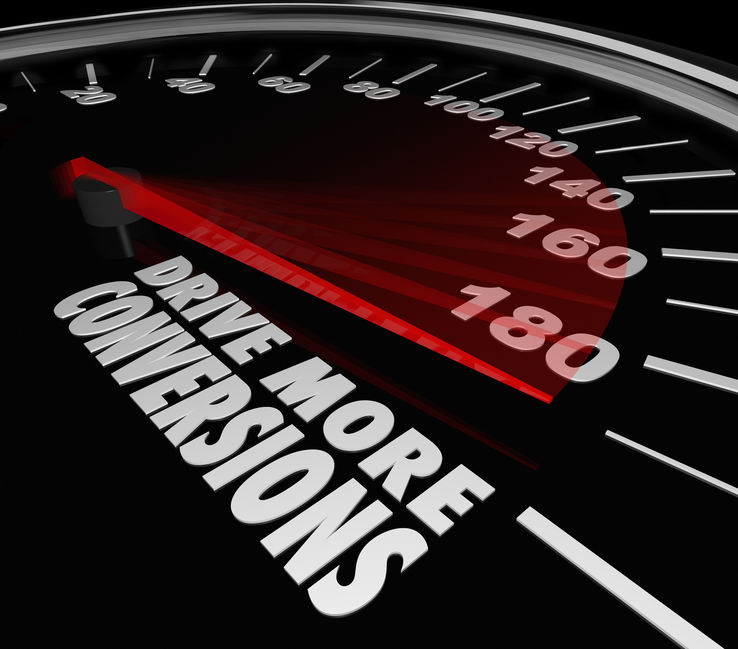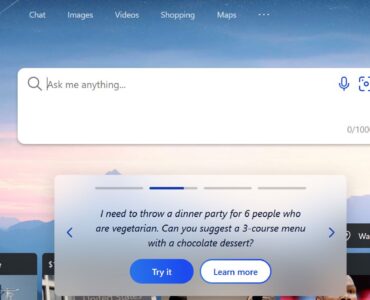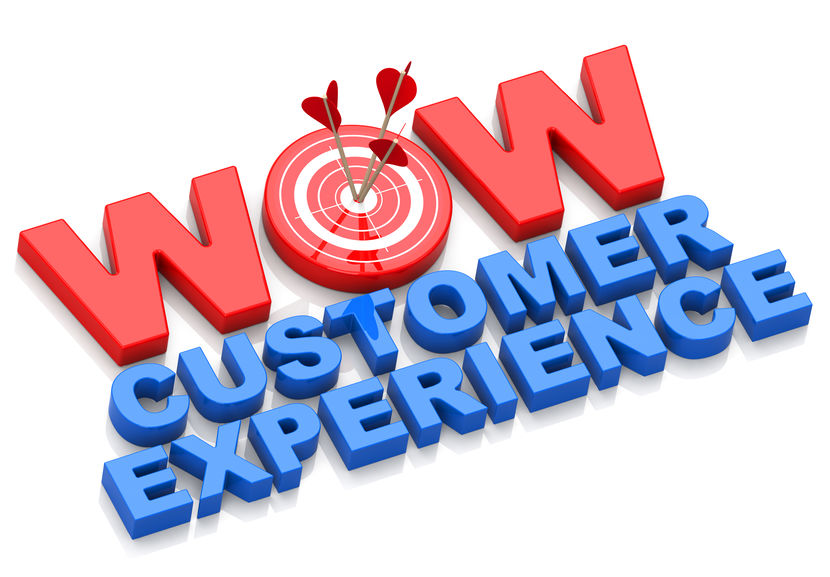SEO is one of the key activities at GTS Translation. Because we live on the Internet. All of our clients find us on the Internet, mostly by searching Bing, Google, DuckDuckGo and similar search engines. We invest considerable resources in SEO and have been doing so for the last 20 years or so. Some clients get to GTS through word-of-mouth. But even those clients are getting referrals from people who found us on the Internet.
Paid search or Organic?
Paid search, also referred to as PPC (Pay Per Click), are the results which can be found at the top and bottom of the first SERP (Search Engine Results Page). The good thing about PPC is that the results are the first ones that the user sees when searching for something on the Internet. So very often these results get clicked. The bad thing about PPC is that it costs money. Sometimes lots of money. And there is no guarantee that the click will result in a sale. As a result, companies can spend a ton of money on PPC and get little or nothing in return. And navigating a successful PPC campaign requires advanced skills and knowledge. So you either have to hire someone who is good or learn it yourself.
How much does PPC cost? It depends on how competitive your business is. If you are selling snow shovels in Hawaii you can buy clicks for pennies. But if you are selling them in Buffalo, NY in January you may need to pay a lot to get to the top of the SERP. The translation business is very competitive. You may need to pay $30 or more for a single click. In some industries you may need to pay over $100 per click. See why Google is one of the richest companies in the world?
Organic search on the other hand does not cost anything. The search engines use algorithms to rank websites and serve results that are deemed to be the most relevant to the search keywords. That’s the good part. The bad part is that ranking for organic search is very difficult. It also takes a lot of time and efforts. For most companies that operate in a highly competitive space, it is impossible to move to the top of the SERPs. So what do those companies do? They spend money on PPC campaigns.
What are Intent Keywords?
Some keywords signal a high level of buying intent. Intent keywords are the ones that users search for when they are ready to buy. Or convert in SEO-speak. These are the keywords that you want to rank for, whether it is in organic search or your PPC campaign. If you have identified a strong intent keyword, then it may be wise to spend $50 a click because good chances the click will convert. One indication that tells you if a keyword has high or low intent is an SEO parameter called Keyword Difficulty (KD). Getting a high organic search ranking for a keyword with a high KD will be challenging.
How to identify intent keywords in your industry? Good question. Once you know the answer, you may be ready to make some money. In the translation business, any keyword search string that has the word services inside is considered to be a sign of intent. So if someone us searching for Document Translation Services they are looking to order. Any keyword search string that has the words price or cost inside is considered to be a sign of intent. Because someone who wants to know the price for professional translation services is probably getting ready to buy. But even these words are can be tricky because competitors may be checking how much you charge and clicking at your expense.
Other words indicate a low or even a total lack of intent. Any string with the words free or job is not an intent keyword. Again, it is up to you to decide which keywords do not signal buying intent.
The challenge is to rank high for the intent keywords and not so much for the non-intent keywords. The garbage keywords may get you a lot of traffic. But this traffic will not put any food on your table.
Playing the Organic SEO crap table

Ranking for SEO means casting a wide net around a wide range of keywords, both short tail and long tail. People search for information in so many ways. It is estimated that over 15% of searches made each day have never been seen before. That’s why organic search can be a crap shoot. The best approach is to write a lot of good quality content on your website. And then link it up on the Internet and social media. Watch your organic traffic grow and your conversions will start to increase.
A Traffic Case Study
Now that we have determined that not all traffic is created equally; and now that we have determined that a small amount of high intent traffic is better than a huge amount of garbage traffic; we will use a test case to illustrate this.

Protranslate is a translation company which is based in Europe. According to Ahrefs, they have a considerable amount of traffic and a strong Domain Rank.

On the other hand, GTS Translation (our own company) has much less traffic and a weaker Domain Rank. Are we doing something wrong? Well maybe not. After drilling into the Organic Keywords on Ahref, we can see that most of the keywords that our competitor ranks for are in the Turkish language. Additionally, many of the keywords have the work Freelance inside which means that people are searching to sell and not to buy.
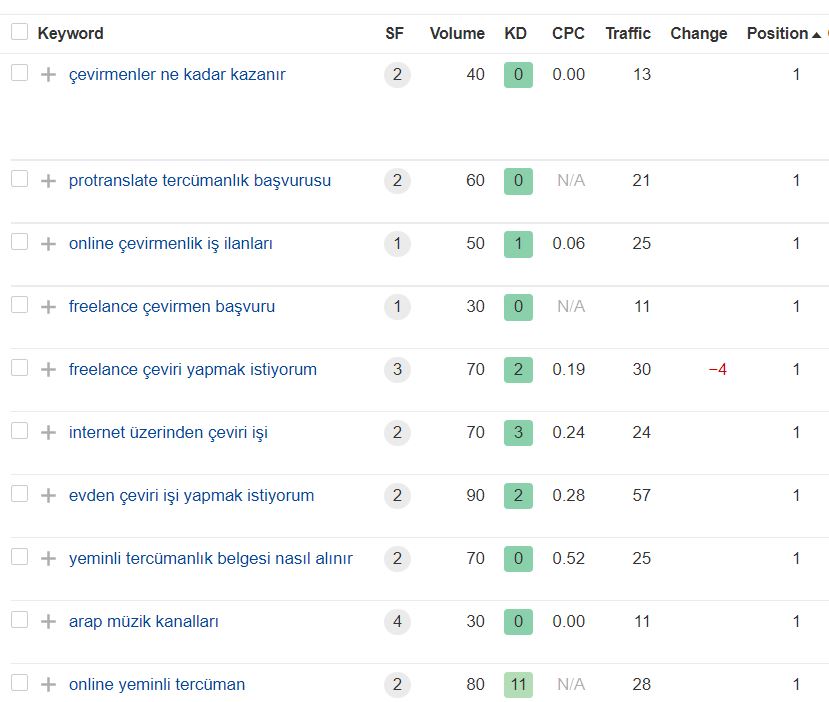
It is apparent that most of the traffic coming to this website has low or even no buying intent. If we look at the KD (keyword difficulty) of the top keywords, we can see that they are around 0. Now let’s look at the Ahref Organic Keywords report on GTS.
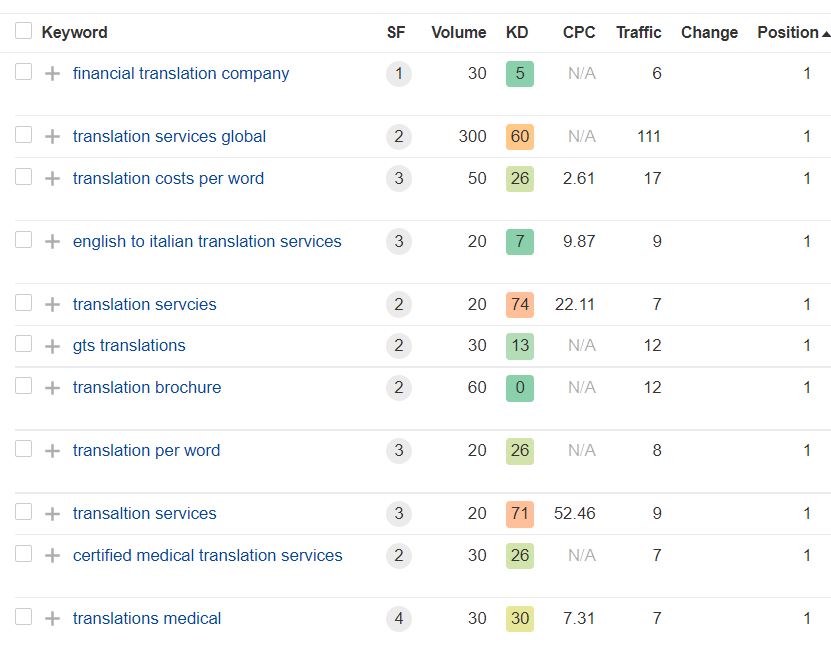
Notice that in our website, we are ranking for high intent keywords that also have a high KD. So even though we have less traffic than Protranslate, We are better at converting. That also explains why Ahrefs puts the Traffic Value of GTS at nearly five times that of Protranslate.
In Summary
Having lots of traffic is great, but better less traffic which is highly targeted than more traffic which does not convert.

